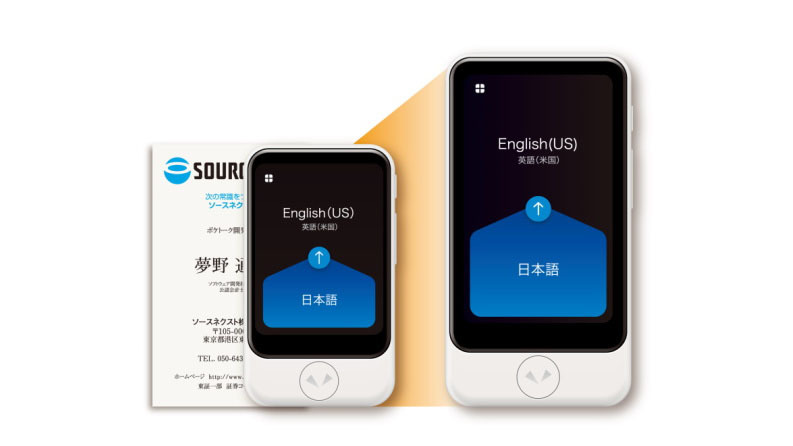What do you do with a travel gadget when no one’s traveling? That problem faced Japan’s Pocketalk at the beginning of last year. Pocketalk is a handheld translator, designed to help travelers have conversations abroad. But the company discovered that there was just as much of a need for translation at home—and at CES this year, it announced the Pocketalk Plus, a translator designed for use from at least 6 feet away.
Pocketalk is made by Sourcenext, a large Japanese software company; the device launched in the US in 2018. It’s a little dedicated voice translation gadget that runs on 4G networks. It’s simpler to use than a translation app on your phone, because it features just one button and doesn’t charge service or roaming fees. (The devices come with two years of unlimited data.) The device works through associations with NTT Docomo, which provides the roaming data service, and Rosetta Stone Japan, which Pocketalk’s parent company bought a few years ago.
The company now has three translators: the earlier Pocketalk Classic ($129), which works in more than 130 countries to translate 82 languages based on up to six translation engines; the Pocketalk S ($299), which is about the size of a business card and with a camera for visual translation; and the new Pocketalk Plus ($329), with a bigger 800-by-480-pixel screen for people who need to do translations while keeping their distance.
Nori Matsuda, Sourcenext’s CEO, had an idea early in the pandemic, when the Diamond Princess cruise ship was stuck in Yokohama harbor with an international array of COVID-19 patients aboard.
“[The authorities] called Nori and said, we have 10 different languages on this boat, we don’t have access to translation lines or translators, and we’re hesitant to expose people,” Pocketalk general manager Joe Miller said. The company sent 13 Pocketalk units to the ship to bridge the language barriers.
Since then, demand has been growing, Miller said. Sourcenext first donated Pocketalks to police, fire, and paramedic groups in cities where language barriers are a problem. As the year went on, he said, they began to hear from school teachers who wanted translation services for their English-language learners.
The Pocketalk Plus comes out of those experiences. It’s designed with a bigger screen that can be read from 6 feet away, and with an Auto Language Identification mode so that no one has to press a button to flip between languages. It connects to Bluetooth speakers to become a multilingual megaphone, so a doctor can say “The 2:15 vaccine appointments are not available” and have it repeated to a big room in several different languages, Miller said. “We can arm people at the front lines while they’re doing these mass immunizations,” he said.
“One of the fascinating things we’ve learned about hospitals is that just getting a communications line can be difficult and time-consuming,” Miller noted. Translation phone lines tend to be expensive, and bringing along relatives for translation can expose them to COVID-19, but Pocketalks “can take care of 200 translations a day.”
Pocketalk’s next stop will be the 2021 Tokyo Olympics, Matsuda said, brandishing an Olympics-branded unit. Olympic staff will use Pocketalk devices and visitors will be able to buy them at major electronics stores in Tokyo to help navigate the city.

